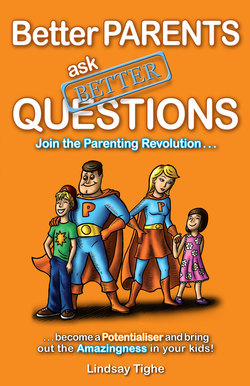Читать книгу Better Parents Ask Better Questions - Lindsay Boone's Tighe - Страница 13
На сайте Литреса книга снята с продажи.
Chapter 2 Your role as parent
ОглавлениеIn the last chapter, I focused on the general hats that we wear in our lives, and I am sure that you will recognise that the roles discussed very much relate to parenting and immediately it becomes clear that many aspects of these hats typically sit more traditionally in the telling space. I say ‘more traditionally’ because in many instances the parenting role is undertaken from a place of learnt behaviour from our own experiences – very rarely is it undertaken from a place of conscious choice. In this chapter I invite you to reflect upon the choices you wish to make about your parenting, given that up until now the choices you have made may well be unconsciously made rather than consciously decided upon.
The starting point for this reflection is to consider your mindset, because what you think drives your behaviours, actions and, ultimately, the results you achieve as a parent. I find that before we can look at changing anything, we have to start by looking at the way we are and the beliefs that sit behind our current behaviour. When we look closely at our beliefs, we frequently find that what we think isn’t something that we have chosen; it is something that has become programmed into our brains through:
•historic experiences or perceived experiences
•being passed on by relations/friends/significant people in our lives
•the media
•religious teachings
•cultural norms
•conforming to popular opinion or the ‘normal’ way of doing things.
Rarely do we make conscious choices about what we believe, and it can be shocking to realise how much of our thinking is based on conforming to set views rather than on independent, well-considered, rational thought. We have a natural tendency to go with the crowd and to conform, and most of the time we don’t even realise we are doing it.
In our society there are many well-intended and strongly opinionated people who are ready to jump in and offer advice to new parents, and whilst often this is useful initially, it is interesting to be aware that we are starting to be inducted into a way of doing things, and the conforming starts without most of us being conscious that we aren’t making choices about what we’d prefer to do. Whilst I accept that very often advice received is beneficial, I would like to suggest that it isn’t always good to make everyone fit into the same box.
Therefore, two good questions to consider at the outset are: “What are my expectations of my role as a parent?” and “How do I want to go about meeting these expectations?” Very often some of this is outlined to you by societal expectations and guidelines and, in the early days, by the experts you come across in your new parenting role. There are very often subconscious messages that you receive that will provide guidance without you even realising it. How often do people willingly give you some friendly advice about what you should and shouldn’t do to be successful as a parent? Whilst the messages are frequently subtle, it is interesting to note the impact they have on you and your thinking, which in turn will affect the way in which you fulfil your role.
